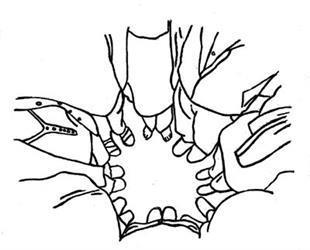Reflections
Written and compiled by Richard Lang.
Freely released into the cosmos every few days...
Freely released into the cosmos every few days...
 Reflection 176
Reflection 176Welcome!
Perfect Obedience
The result of observing only the universe is anxiety. Only observing the Observer of the universe will put a stop to a man’s worrying and fussing and scheming. When his interest is diverted inwards he naturally relaxes his hold – his stranglehold – on the outer world. Having withdrawn his capital and paid it into his own Central Bank (where it appreciates to infinity), he has nothing to lose out there and no reason for interfering. He knows how to let things be and work out in their own time. He’s in no hurry. Knowing the Self, he can hardly fail to trust its products. Whatever occurs is fundamentally agreeable to him. In Christian terms, he has no will but God’s: what he wants is what happens and what happens is what he wants. Paradoxically his obedience to the nature of things is his rule over them. His weakness is in the long run all-powerful. And the secret of his power over things is that he goes to the Source. “Seek ye first the Kingdom of God, and all these things shall be added unto you.” Seek ye first these things, and even they shall be taken away.
This perfect obedience isn’t just lining oneself up with God’s will, or imitating it, or even becoming part of it. It’s that very will itself in full operation. If we wish to find out what it’s really like to create the world, we have only to desire nothing and pay attention. But total acceptance is very hard. It’s precisely the opposite of the lazy indifference that lets things slide. It springs from inner strength and not weakness, from concentration, not slackness. Why is the world so troublesome, so frightful? Is it like that by nature, or because we take the easy way of fighting it instead of the difficult way of fitting in with it? We have to find out for ourselves the truth of the sage’s demonstration that even in the smallest things the way of non-interference, of giving up all self-will, of “disappearing,” is astonishingly practical, the way that works. Not only in the long run but from moment to moment consciously getting out of the Light, giving place to whatever happens to be presenting itself in that Light, is astonishingly creative. We do too much and therefore remain ineffectual, we talk far too much and therefore say nothing, we think far, far too much and therefore prevent the facts from speaking for themselves – so say those who know the value of emptiness. It’s for us to make our own tests, not – repeat not – by the direct method of trying to be quiet and mindless (it just won’t work) but by the indirect method of seeing Who, it seems, was trying to be like that. No man becomes Godlike except by seeing that he isn’t a man anyway. (Douglas Harding. Look For Yourself.)
Please send your comments to Richard


















